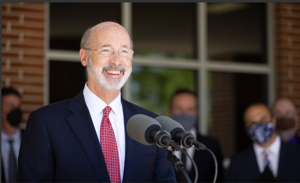Wolf refocuses on education policies ahead of budget negotiations

(The Center Square) – Pennsylvania Gov. Tom Wolf refocused his efforts this week on his public education policies – unpopular within the Republican-controlled General Assembly – as state budget negotiations intensify ahead of the June 30 deadline.
The governor shared the stage with lawmakers and school leaders in Pottstown on Wednesday to discuss the effect of charter schools on district budgets and said his reforms could save $395 million.
“The skyrocketing cost of charter schools is costing taxpayers way too much money, and these costs have grown during the pandemic,” he said. “This hurts students and communities by forcing school districts to cut learning programs and raise property taxes, just as students are going back to school and families are recovering from the pandemic.”
Cyber charter school enrollment soared last year as students fled district schools amid the uncertainty of the pandemic. Districts said the unexpected spike came at a time when reduced tax revenue and other unanticipated costs – such as personal protective equipment, cleaning supplies and enhanced technology needed for remote instruction – strained already tight budgets.
Art Levinowitz, president of the Pennsylvania School Boards Association and an Upper Dublin School Board member, said his district weathered a 200% increase in cyber charter tuition last year.
“The state must enact comprehensive reforms to address areas of charter school operations, accountability and funding,” he said.
Wolf said creating one standardized tuition rate of $9,500 per student – instead of the $9,170 and $22,300 range that currently exists – for all cyber charters would save districts $120 million. The administration also wants to distribute special education funds through an updated formula that was adopted by the Pennsylvania Legislature in 2015 to save another $185 million.
Charter schools receive a special education funding amount equal to 16% of their enrollment. Critics said this outdated notion means some charters are “overpaid” for services they do not provide.
“We need to fix this broken system that is diverting more and more resources away from children in already underfunded public schools,” said Sen. Tim Kearney, D-Springfield. “We cannot wait any longer to deliver a high quality education to every student, because our kids are worth it.”
House Bill 272, introduced in the lower chamber in January, would implement transparency and accountability measures, alongside the funding changes, to better connect public funding with charter performance, prime Rep. Joe Ciresi, D-Royerford, said.
It addresses a complaint from school board leaders who argue charter schools escape accountability while taking taxpayer money because their board members are appointed, not elected. This leaves critical gaps in oversight that allow problematic schools to stay operational.
“Pressure continues to grow on the Legislature to make long-overdue changes to our outdated and broken charter school law,” Ciresi said. “It’s time. HB 272 needs to pass, for our students, our taxpayers and our communities.”
For school-choice advocates, however, the governor’s proposal reeks of inequity and partisanship. Lenny McAllister, CEO of the Pennsylvania Coalition of Public Charter Schools, likened the administration’s “cost savings” to “an attack on families who have exercised their right to choose a public charter school for their children.”
“It harms those already hurting and helps those that already have billions in resources,” he said. “Robbing Peter to please Paul is not a ‘cost saving,’ and this approach is not helping Pennsylvania families overcome the lingering effects the pandemic has had on education.”
The Commonwealth Foundation, a free-market focused advocacy organization, said because tuition rates subtract certain costs upfront – including transportation, facilities and debt services – charter schools receive about 27% less per student than the district does.
PCPCS said the change in special education funding would cut $99 million from cyber charter schools and would have a devastating effect on those students.
“If we are truly ‘in this together,’ togetherness must include all public schools, including charter schools,” McAllister said. “Now is not the time to pick winners and losers within public education, especially when the most vulnerable among us are counting on our partnership for a better Pennsylvania.”
Wolf doesn’t just want to change the way charter schools are funded, however. He said the Legislature should funnel the entirety of the state’s $6.4 billion spent on public education through the updated formula so that money flows to the schools that need it most.
Currently, only about $700 million of state education funding is distributed based on a formula adopted in 2016 by the General Assembly that considers a district’s percentage of disadvantaged students. The majority is doled out based on 1992 funding levels.
“Schools with increasing enrollment in urban, suburban and rural communities will finally be funded fairly and shrinking districts are protected,” Wolf said. “Our state can no longer wait to address the school funding problem. Every student deserves a good education, no matter where they live. That’s what parents want for their children, and what Pennsylvania needs for our future.”
Legislative Republicans, however, have scoffed at the administration’s proposal to increase personal income taxes to fund a $1.35 billion boost in education spending. The idea likely is even less popular with the influx of $7.3 billion in federal pandemic aid awarded to the state in March.
Still, the administration believes raising revenue via a tax increase will better address the state’s $2 billion structural deficit.
“It’s important to fill the holes and address the needs in the short term, but that doesn’t take away from the structural deficit,” Budget Secretary Jen Swails said during a late-April hearing of the Senate Appropriations Committee. “While I know a conversation on increased revenue is difficult, addressing the structural deficit needs to occur at some point in time and I know with that $7.3 [billion] coming in, that makes it a lot harder to discuss.”
Disclaimer: This content is distributed by The Center Square
